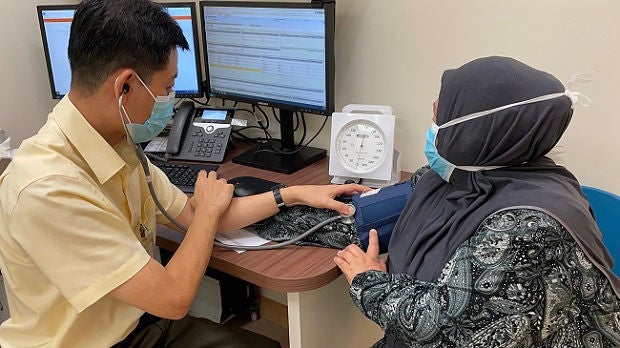
Fasting for a blood test to check your cholesterol levels may soon become a thing of the past.
To determine cholesterol levels, patients typically fast for eight to 12 hours before a blood test. Tests are usually done in the early morning to avoid or minimise causing low blood sugar or dehydration. As SingHealth Polyclinics (SHP) sees more than 100,000 patients with dyslipidemia (cholesterol level that is too high), it is challenging to cater to large numbers of patients in the early morning. The good news is, many patients may no longer need to fast before their tests in the near future.
A study in Denmark found that in a select pool of patients, the cholesterol levels from their tests were similar regardless whether they fasted. Due to the growing number of people with dyslipidemia in Singapore, SHP conducted its own research to evaluate the effects of non-fasting cholesterol tests on Asians.
A paradigm shift
The study compared the fasting and non-fasting cholesterol levels of 470 patients with high cholesterol and type 2 diabetes who were on statins, a class of cholesterol-reducing drugs. It showed little difference in the total cholesterol, high-density lipoprotein (HDL) and low-density lipoprotein (LDL) levels between the non-fasting and fasting results, though there was a slight increase in the triglycerides component for most of the non-fasting tests.
“This changes the paradigm and the thinking that patients must fast for a cholesterol test,” said Dr Ian Phoon (pictured below), Consultant, Clinical Lead, Cardiovascular Health Workgroup, SHP, and the main author of this research paper.

“HDL is the ‘good’ cholesterol that absorbs cholesterol from the blood and sends it to the liver for excretion, whereas high LDL levels indicate higher risk of heart disease or stroke, as excessive LDL can lead to a build-up of plaque in the arteries and cause narrowing of or clotting in the blood vessels,” said Clinical Associate Professor Tan Ngiap Chuan (pictured below), Director of Research, SHP, and Vice-Chair, Research, SingHealth-Duke NUS Family Medicine Academic Clinical Programme.

Triglycerides are a type of fat (lipid) in the blood. When a person eats, the body converts calories that it does not immediately need into triglycerides, which are stored in the fat cells. In between meals, hormones release the triglycerides for energy.
Some exceptions
SHP is in the midst of implementing non-fasting cholesterol tests in all its polyclinics.
Despite the research findings, there will still be a small group of patients who are required to fast before their cholesterol blood tests. Six of these subjects (1.28 per cent) had very high triglyceride when they did not fast, causing their LDL to be unmeasurable.
“If a patient is known to have a fasting triglyceride of more than 4.0 mmol/l, he or she should not be offered a non-fasting test, as there is a risk that the triglyceride will rise too high for the LDL to be measurable,” Dr Phoon said.
In the coming months, most patients can have a meal before going for their cholesterol test. “Even though there is no need to fast, patients should avoid having a heavy meal. Patients should eat a well-balanced meal before doing the test,” Dr Phoon said.
Get the latest updates about Singapore Health in your mailbox! Click here to subscribe.













 Get it on Google Play
Get it on Google Play